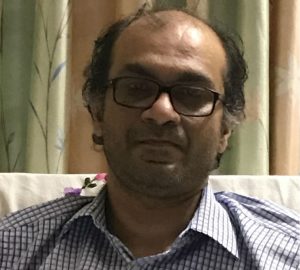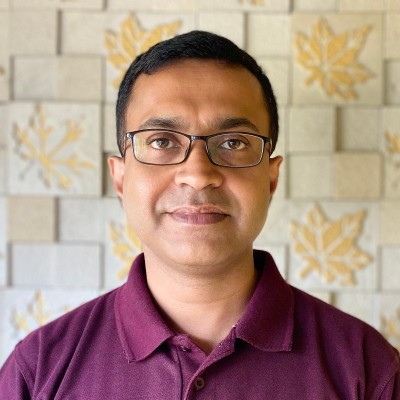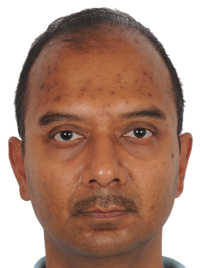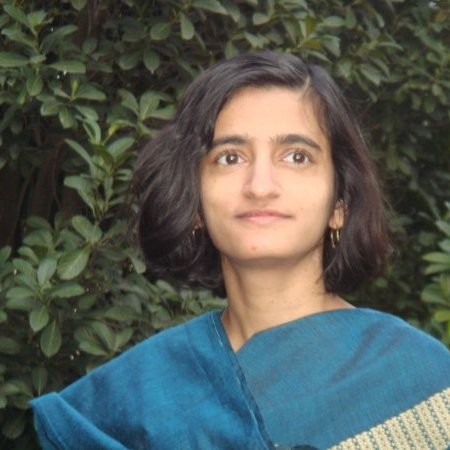Through the Looking Glass
Abstract:
The AIMLSystems conference is in the fascinating intersection of systems engineering and artificial intelligence. The differences between the traditional research and development practices in these two fields could not be more stark! This talk will go into some observations about the operational differences between these two fields and a personal take on how graduate students in this area can navigate through their career path.
The AIMLSystems conference is in the fascinating intersection of systems engineering and artificial intelligence. The differences between the traditional research and development practices in these two fields could not be more stark! This talk will go into some observations about the operational differences between these two fields and a personal take on how graduate students in this area can navigate through their career path.
Bio:
Amit explores the next generation of technology at the intersection of networks, distributed systems, and data science, with a special emphasis on system wide design. He is a Principal Engineer in the Camera Intelligence team at Cisco Meraki working on ML related features for Meraki’s MV Smart Cameras. Before Cisco, he was with Juniper Networks as an early member of the QFabric project, building the industry’s first massively distributed data centre switch. Prior to that, he was with Tropos Networks, building and deploying WiFi based outdoor mesh networks. He passionately seeks out opportunities to give back to the community through talks, research collaborations, organising conferences, and as visiting faculty at several institutes in India. He received his PhD in Computer Science from Rice University in 2007. Prior to that, he obtained his BTech in Computer Science and Engineering from IIT Kharagpur.
Amit explores the next generation of technology at the intersection of networks, distributed systems, and data science, with a special emphasis on system wide design. He is a Principal Engineer in the Camera Intelligence team at Cisco Meraki working on ML related features for Meraki’s MV Smart Cameras. Before Cisco, he was with Juniper Networks as an early member of the QFabric project, building the industry’s first massively distributed data centre switch. Prior to that, he was with Tropos Networks, building and deploying WiFi based outdoor mesh networks. He passionately seeks out opportunities to give back to the community through talks, research collaborations, organising conferences, and as visiting faculty at several institutes in India. He received his PhD in Computer Science from Rice University in 2007. Prior to that, he obtained his BTech in Computer Science and Engineering from IIT Kharagpur.
Temporal Knowledge Graph Representation and Question Answering
Abstract:
A knowledge graph (KG) consists of labeled (subject, relation, object) or (s,r,o) edges between entity node pairs. KGs are notoriously incomplete. KG completion (KGC) predicts missing edges, given an incomplete KG. Temporal KGs associate (s,r,o) triples with a set of times (or a single time instant) during which the relation is valid, leading to tuples of the form (s,r,o,t). While time-agnostic KGC has witnessed significant research, temporal KGC (TKGC) is in its early days. In this talk, we first consider the tasks of predicting missing entities (link prediction) and missing time intervals (time prediction) as joint TKGC tasks where entities, relations, and time are all embedded in a uniform, compatible space. We present TimePlex, a novel time-aware KBC method, that also automatically exploits the recurrent nature of some relations and temporal interactions between pairs of relations. TimePlex achieves state-of-the-art performance on both prediction tasks. Second, we show how to exploiit a temporal KG to answer complex temporal questions. While Question Answering over KG (KGQA) has received some attention from the research community, QA over Temporal KGs (Temporal KGQA) is a relatively unexplored area. We have released CronQuestions, the largest known Temporal KGQA dataset, clearly stratified into buckets of structural complexity. CronQuestions expands the only known previous dataset by a factor of 340x. We find that various state-of-the-art KGQA methods fall far short of the desired performance on this new dataset. In response, we also propose CronKGQA, a transformer-based solution that exploits recent advances in Temporal KG embeddings, and achieves performance superior to all baselines, yet falling short of human performance for the more complex query structures, underscoring the need for further research.
Relevant resource URLs-
https://github.com/dair-iitd/tkbi
https://arxiv.org/abs/2106.01515
https://github.com/apoorvumang/CronKGQA
A knowledge graph (KG) consists of labeled (subject, relation, object) or (s,r,o) edges between entity node pairs. KGs are notoriously incomplete. KG completion (KGC) predicts missing edges, given an incomplete KG. Temporal KGs associate (s,r,o) triples with a set of times (or a single time instant) during which the relation is valid, leading to tuples of the form (s,r,o,t). While time-agnostic KGC has witnessed significant research, temporal KGC (TKGC) is in its early days. In this talk, we first consider the tasks of predicting missing entities (link prediction) and missing time intervals (time prediction) as joint TKGC tasks where entities, relations, and time are all embedded in a uniform, compatible space. We present TimePlex, a novel time-aware KBC method, that also automatically exploits the recurrent nature of some relations and temporal interactions between pairs of relations. TimePlex achieves state-of-the-art performance on both prediction tasks. Second, we show how to exploiit a temporal KG to answer complex temporal questions. While Question Answering over KG (KGQA) has received some attention from the research community, QA over Temporal KGs (Temporal KGQA) is a relatively unexplored area. We have released CronQuestions, the largest known Temporal KGQA dataset, clearly stratified into buckets of structural complexity. CronQuestions expands the only known previous dataset by a factor of 340x. We find that various state-of-the-art KGQA methods fall far short of the desired performance on this new dataset. In response, we also propose CronKGQA, a transformer-based solution that exploits recent advances in Temporal KG embeddings, and achieves performance superior to all baselines, yet falling short of human performance for the more complex query structures, underscoring the need for further research.
Relevant resource URLs-
https://github.com/dair-iitd/tkbi
https://arxiv.org/abs/2106.01515
https://github.com/apoorvumang/CronKGQA
Bio:
Soumen Chakrabarti is a Professor of Computer Science at IIT Bombay. He works on linking unstructured text to knowledge bases and exploiting these links for better search and ranking. Other interests include link formation and influence propagation in social networks, and personalized proximity search in graphs. He has published extensively in WWW, ACL, EMNLP, AAAI, IJCAI, SIGKDD, VLDB, SIGIR, ICDE and other conferences. He won the best paper award at WWW 1999. He was coauthor on the best student paper at ECML 2008. His work on keyword search in databases got the 10-year influential paper award at ICDE 2012. He got his PhD from University of California, Berkeley and worked on Clever Web search and Focused Crawling at IBM Almaden Research Center. He has also worked at Carnegie-Mellon University and Google. He received the Bhatnagar Prize in 2014 and the Jagadis Bose Fellowship in 2019.
Soumen Chakrabarti is a Professor of Computer Science at IIT Bombay. He works on linking unstructured text to knowledge bases and exploiting these links for better search and ranking. Other interests include link formation and influence propagation in social networks, and personalized proximity search in graphs. He has published extensively in WWW, ACL, EMNLP, AAAI, IJCAI, SIGKDD, VLDB, SIGIR, ICDE and other conferences. He won the best paper award at WWW 1999. He was coauthor on the best student paper at ECML 2008. His work on keyword search in databases got the 10-year influential paper award at ICDE 2012. He got his PhD from University of California, Berkeley and worked on Clever Web search and Focused Crawling at IBM Almaden Research Center. He has also worked at Carnegie-Mellon University and Google. He received the Bhatnagar Prize in 2014 and the Jagadis Bose Fellowship in 2019.
ML at Amazon: Learnings for Prospective Applied Scientists
Abstract:
Amazon has an ML team in India that focuses on driving broad ML based initiatives, developing models for these initiatives and owning ML systems that power these models. As part of this team, we have developed and deployed a wide variety of models covering areas such as ranking, forecasting, advertising, and conversations AI. In this talk, I will focus on a few business problems and associated ML challenges that we have been working on for the past few years. The talk will use these problems as cues to bring out learnings that could guide fresh graduate students towards a career in an applied science lab within the industry.
Amazon has an ML team in India that focuses on driving broad ML based initiatives, developing models for these initiatives and owning ML systems that power these models. As part of this team, we have developed and deployed a wide variety of models covering areas such as ranking, forecasting, advertising, and conversations AI. In this talk, I will focus on a few business problems and associated ML challenges that we have been working on for the past few years. The talk will use these problems as cues to bring out learnings that could guide fresh graduate students towards a career in an applied science lab within the industry.
Bio:
Vineet is a Sr. Applied Science Manager within the International Machine Learning team at Amazon, where he leads a wide variety of projects related to forecasting, advertising, customer targeting and conversational experiences. Prior to joining Amazon, Vineet was a scientist at Yahoo! Labs where his research focused on online advertising and social networks. Vineet obtained a PhD in Computer Science from Rensselaer Polytechnic Institute. He has published at top-tier data mining and applied machine learning conferences and journals. Vineet also serves on the program committees of leading machine learning conferences.
Vineet is a Sr. Applied Science Manager within the International Machine Learning team at Amazon, where he leads a wide variety of projects related to forecasting, advertising, customer targeting and conversational experiences. Prior to joining Amazon, Vineet was a scientist at Yahoo! Labs where his research focused on online advertising and social networks. Vineet obtained a PhD in Computer Science from Rensselaer Polytechnic Institute. He has published at top-tier data mining and applied machine learning conferences and journals. Vineet also serves on the program committees of leading machine learning conferences.

Chiranjib Bhattacharyya
Professor, Department of Computer Science and Automation, IISc Bangalore, India
Bio:
Chiranjib Bhattacharyya is currently a Professor and Chair of the Department of Computer Science and Automation, Indian Institute of Science. His research interests are in foundations of Machine Learning, Optimisation and their applications to Industrial problems. He has authored numerous papers in leading journals and conferences in Machine Learning. Some of his results have won best paper awards. He joined the Department of CSA, IISc, in 2002 as an Assistant Professor. Prior to joining the Department he was a postdoctoral fellow at UC Berkeley. He holds BE and ME degrees, both in Electrical Engineering, from Jadavpur University and the Indian Institute of Science, respectively, and completed his PhD from the Department of Computer Science and Automation, Indian Institute of Science. He is fellow of Indian Academy of Engineering and Indian Academy of Sciences. For more information about his work please see http://mllab.csa.iisc.ac.in.
Chiranjib Bhattacharyya is currently a Professor and Chair of the Department of Computer Science and Automation, Indian Institute of Science. His research interests are in foundations of Machine Learning, Optimisation and their applications to Industrial problems. He has authored numerous papers in leading journals and conferences in Machine Learning. Some of his results have won best paper awards. He joined the Department of CSA, IISc, in 2002 as an Assistant Professor. Prior to joining the Department he was a postdoctoral fellow at UC Berkeley. He holds BE and ME degrees, both in Electrical Engineering, from Jadavpur University and the Indian Institute of Science, respectively, and completed his PhD from the Department of Computer Science and Automation, Indian Institute of Science. He is fellow of Indian Academy of Engineering and Indian Academy of Sciences. For more information about his work please see http://mllab.csa.iisc.ac.in.
Bio:
Suparna Bhattacharya is a Distinguished Technologist in the AI research lab at Hewlett Packard Labs, with a current focus on data centric trustworthy AI. She has a deep experience in several areas of systems software development and research with a passion for realizing innovations that blend insights from diverse computing domains. This includes several enjoyable years of open source contributions to the Linux kernel, 28 granted patents and a book on Resource Proportional Software Design for Emerging Systems. Suparna is an IEEE Fellow and a Fellow of the India National Academy of Engineering, and has served regularly on program committees for top tier conferences in computer science. She holds a B.Tech from IIT Kharagpur (1993) and a late-in-life PhD from the Indian Institute of Science (2013).
Suparna Bhattacharya is a Distinguished Technologist in the AI research lab at Hewlett Packard Labs, with a current focus on data centric trustworthy AI. She has a deep experience in several areas of systems software development and research with a passion for realizing innovations that blend insights from diverse computing domains. This includes several enjoyable years of open source contributions to the Linux kernel, 28 granted patents and a book on Resource Proportional Software Design for Emerging Systems. Suparna is an IEEE Fellow and a Fellow of the India National Academy of Engineering, and has served regularly on program committees for top tier conferences in computer science. She holds a B.Tech from IIT Kharagpur (1993) and a late-in-life PhD from the Indian Institute of Science (2013).

















